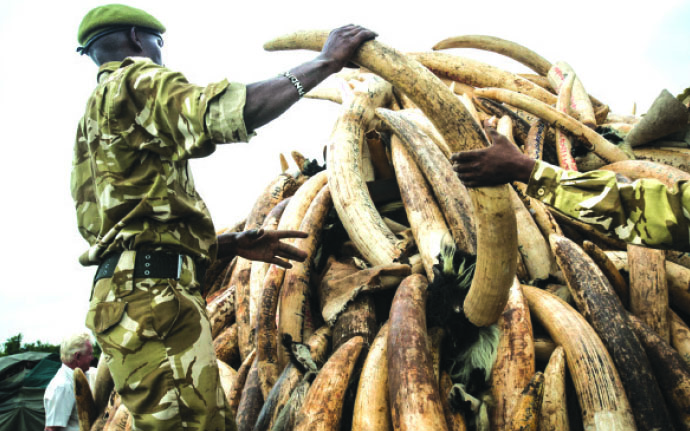
ZimParks’s crack down needs support to show that Zimbabwe is serious when Government officials talk of tackling corruption and wildlife crime, from the top to bottom and vice versa
Jeffrey Gogo Climate Story
Criminals come from all walks of life. But few predict that those employed in wildlife protection that are expected to set the good example, will be involved or connected to the trafficking wild animals or their products.
The jury is still out on suspended Zimbabwe Parks and Wildlife Management Authority (ZimParks) boss Edson Chidziya. However, by turning in its most senior employee to the police, the ZimParks board has demonstrated that it is prepared to crack down hard on corruption within its rank and file.
Chidziya is accused of turning a blind eye in the theft of $3 million rhino horn worth from the authority’s inventory. Though aware of the disappearance of the 56 horns – unearthed in a 2015 audit – it is alleged that Chidziya decided to keep quiet about it.
He is now in the dock facing charges of abusing his office criminally, together with three others, senior ZimParks staffers — audit manager Gift Kuwora, wildlife officer Padgewell Mazoyo and ex-security officer Munyaradzi Nhira.
As criticism piled the authority wasn’t doing enough to kick out corruption from the inside, ZimParks chairman Tichafa Mundangepfupfu is now trying to send a strong message to wildlife criminals within his ranks – and beyond – that he will not tolerate corruption, particularly the kind that oils the global trafficking syndicates.
Often times, some rangers and officials from ZimParks have been accused by conservationists of colluding with the wildlife mafia in a web of a complex and thriving underground wildlife trade.
It is an attractive and very rewarding trade – an industry valued at $10 billion worldwide. Now, with an elephant herd in excess of 80 000, and over 750 rhino, Zimbabwe is a poachers’ paradise. But illegal deals involving ZimParks employees often sail beneath the radar, and when detected, are seldom prosecuted with any success.
Chidziya’s case shows that the ZimParks board is now battling to keep away individuals that have sworn to protecting wildlife from doing exactly the opposite, their inside knowledge decisively providing culprits with the information and product they so desperately need to feign legitimacy. This kind of knowledge comes priceless to the wildlife mafia.
The 2015 audit has not been made public, and so details remain sketchy. Chidziya’s case is attacking inaction rather than action and if past crimes are anything to go by, then the trend follows a common pattern, never disorderly, forever organised: ZimParks employees, with inside knowledge, stealing elephant tusks or rhino horn stored away due to a global ban on ivory trade, and then selling it to international traffickers through a ring of inside and outside contacts.
A 2016 report by Oxpeckers Center for Investigative Journalism in Africa found that some ZimParks employees at the Hwange National Park, which houses 50 percent of the country’s 70 tonne ivory stockpile, “managed to steal and export ivory undetected by manipulating the registration system.”
The ZimParks system seems smart from without, but the employees were smarter. “The alleged theft was engineered through a double registration system that gave one serial number to two identical pieces of ivory booked into storage,” the Oxpeckers investigation reveals.
Over 60 of the stolen tusks were intercepted by the police at the Harare International Airport in 2015, on their way to China, arguably the biggest ivory trafficking country in the world. But complete with fake export permits from the parks authority, the mafia is as organised as any other genuine business operation.
After a few arrests, a couple of court appearances, no one was ever successfully prosecuted in this theft. Now that’s one of the biggest worry in wildlife crime — only the small fish serve jail time, never the traffickers syndicate bosses — a concern that puts Mundangepfupfu’s efforts to a test, as indeed the integrity of Zimbabwe’s justice system. Harare lawyer Patrick Jonhera says successful prosecutions rely on concrete evidence.
However, in a world of intricate, organised wildlife crime, that can be a tough ask. “As in all court cases, the lack of evidence would have an effect,” Jonhera told The Herald Business. “The state must prove its case beyond a reasonable doubt which means their evidence should be of a higher standard.”
Renowned conservationist and Zimbabwe’s rhino ambassador Charlene Hewit has in the past expressed disappointment that “poachers are caught and are let off on a very small bail.”
In 2013 alone, some 20 000 elephants were slaughtered for their ivory across Africa.
In the same year, more than 1 000 rhinos were killed on the continent.
Mundangepfupfu’s crack down needs support to show that Zimbabwe is serious when Government officials talk of tackling corruption and wildlife crime, from the top to bottom and vice versa.
God is faithful.
